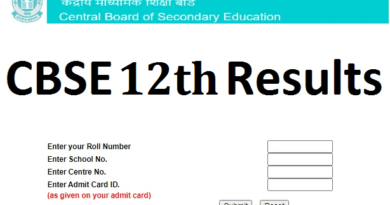Class 12 marks: SC approves CBSE’s 30:30:40 formula
Class 12 marks: SC approves CBSE’s 30:30:40 formula:
The Supreme Court on Thursday gave in-principle clearance to the schemes placed on record by the CBSE and ICSE to assess the final marks of Class 12 students whose Board exams were cancelled due to the COVID-19 pandemic.
The CBSE has divided the marks’ assessment process into two components — theory and practical.
The theory component would be assessed by first giving 30% weightage to average scores obtained by students in Class 10 in their three best performing subjects out of a total five. Secondly, another 30% weightage would be given to marks based on the theory component of the final exam taken in Class 11. Finally, 40% weightage would be given for marks obtained in one or more unit tests, mid-term exams and pre-board exams in Class 12.
So, if the total marks for theory is 80. The 30% weightage of Classes 10 and 11 would come to 24 marks each. The 40% weightage derived from performance in various tests conducted in Class 12 year would translate to 32 marks.
On the practical component side, calculation would be on the “actual basis” of the marks uploaded by schools on the CBSE portal. According to the scheme, the total marks awarded should be in consonance with the past performance of the school in Class 12 Board examinations.
Result committee
A result committee under the principal would be formed in each school comprising two seniormost postgraduate teachers from the same school and two postgraduate teachers from neighbouring schools. The committee has been given the liberty to prepare the result by following the policy. The CBSE would aid them by establishing a help desk and also by providing software support, etc, to prepare the result. The CBSE said it would declare the results by July 31, 2021.
In case any candidate is not satisfied with the assessment done, based on the policy, he or she would be given an opportunity to take the examinations to be conducted by the Board when the situation is more “conducive”.
“Most of the candidates will be happy with this scheme… When there is a manageable number you can consider holding a physical exam later,” a Bench of Justices A.M. Khanwilkar and Dinesh Maheshwari addressed Attorney-General K.K. Venugopal, appearing for the Union of India, which is CBSE’s controlling authority.
CISCE formula
The Council for the Indian School Certificate Examination (CISCE) assessment formula would include taking into consideration the students’ Class 10 ICSE Board exams, project and practical work in subjects, best marks obtained in school exams in Classes 11 and 12 and the best performance of the school itself in the past six years.
“The situation which CBSE and ICSE faced was unprecedented. It has never before happened in the history of this country. We had to innovate. A committee of 13 experts went through numerous alternatives to finally decide on this policy,” Mr. Venugopal submitted.
Mr. Venugopal said the committee led by Vipin Kumar, Joint Secretary, Ministry of Education, held a meeting with the principals of CBSE-affiliated schools. The feedback was obtained from 229 Sahodaya School Complexes, comprising 7,734 schools, regarding the policy which would determine the future of about 14.5 lakh Class 12 students this year.
Two suggestions
On its part, the court asked Mr. Venugopal to “incorporate” two suggestions in the final schemes.
“First, you have to provide an in-built dispute resolution mechanism in the policy for students unhappy with their assessment. Secondly, specify the timeline for the declaration of results and the date by which the optional (physical) exams would be conducted in the policy itself,” Justice Khanwilkar addressed Mr. Venugopal.
The court declined a primary plea made by some interveners, represented by senior advocate Vikas Singh, to revisit its earlier order recording the government’s decision to cancel the Class 12 Board exams.
“This plea cannot be taken forward. We had already accepted the decision in principle. An opportunity is given in the policy for students who want to appear in the physical exams… No prejudice is thus caused to any student,” the court said.
However, the court, while asking the CBSE and the ICSE to go ahead and notify their respective schemes, scheduled the case again on June 20 to give some of the interveners, including Mr. Singh, to study the schemes and come up with any further suggestions.
“You (CBSE/ICSE) go ahead and notify the schemes. If there any further suggestions to be incorporated, we can direct you to do so by way of a corrigendum,” the court told Mr. Venugopal and Solicitor General Tushar Mehta, who appeared for the CBSE.

